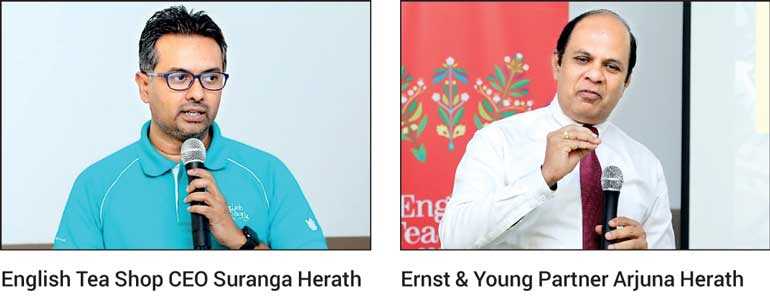Sunday Feb 22, 2026
Sunday Feb 22, 2026
Friday, 22 November 2019 00:02 - - {{hitsCtrl.values.hits}}

Established in 2010, The ‘English Tea Shop’ (ETS) brand of Amazon Trading Ltd., brings to life its passion of doing things differently by putting people and purpose before profit. Its mantra of ‘celebrating communities from farm to cup’ has acted as a blueprint on its road to success in over 55 markets worldwide and being listed in this year’s London Stock Exchange Group’s 1000 ‘Company to Inspire Britain’. The company has achieved many accolades owing to its ambitious journey to inspire its tea loving community.
The organic tea brand ‘English Tea Shop’, is a true mastery built upon creativity and ingenuity to bring forth a premium blend of value-added organic tea. Grown by small farmers, all ETS tea are made without chemical fertilisers or pesticides and picked in limited quantities before being packed in English Tea Shop’s own factory in Sri Lanka. The Board of Directors of Amazon Trading Ltd. takes its relationship with all its stakeholders from the small farmers, all the way to the global markets quite serious.
They believe that, only through bringing a positive impact to each individual within the entire ecosystem, can a business achieve sustainability and continuity. ETS believes, the sole legitimate purpose of business is to create social and commercial value across the value chain and in doing so it has spearheaded its journey in creating a ‘Business of Business’ people.
English Tea Shop CEO Suranga Herath stated that they endeavoured on a journey of building a ‘significantly employee owned organisation’ with the launch of a company wide open book management program in 2015. With the ‘Big Game’, the company was able to achieve many milestones including open access to the company ledger, revisions to the KPIs and performance appraisals, measuring financial metrics, quarterly bonuses, whilst celebrating as well as assessing the company performance on a weekly basis. All these efforts have contributed to creating an owner mindset in ETS employees, thus the interest and passion towards business excellence.
ETS aspirations further flourished with the recent launch of its very-own Employee Share Ownership Plan (ESOP) following the appointment of domain specialist Ernst & Young.
The Employee Share Ownership Plan will align the interest and commitment of ETS employees towards business success. It will facilitate a broad-based ownership with employees of the company and thereby create a platform to drive performance and share value in a meaningful manner. The company would be perceived amongst peer groups as an entity that offers an attractive long-term reward linked to performance.
The ESOP will enhance shareholder value by creating a clear nexus between employee contribution to profit and return on equity whilst promoting an ethical and sustainable business. “When the wealthiest in the world are still making gains from long-term investments in shares, this is a natural next step towards a strong foundation for sustainability, succession and long-term prospects,” stated Suranga Herath at the staff awareness workshop held recently.
The ETS ESOP was a custom-made effort by EY to build an inclusive culture and to express good faith through recognising and rewarding staff efforts considering their good standing, tenure, individual performance and level of significance in contributing to organisation’s wealth creation. The initiative also opened doors for the voice of staff to be represented at the board level. This will further enable the company to take difficult decisions such as foregoing short-term benefits to achieve longer-term objectives, with wider support. The initiative has already set a growth momentum for ETS and helps to achieve many accolades in future as a true model company that aspires to be a ‘significantly employee owned organisation’.
Ernst & Young Partner Advisory Arjuna Herath commented: “Where majority of the companies allocate up to 5% of their total issued share capital towards share based incentive plans, Gamini Jayaweera and Suranga Herath took the initiative of allocating a generous 15% of total issued share capital of the company to a Trust at zero cost, upholding its commitment to its people and purpose before profit.”
As an initial phase, the eligible employees of the scheme will be entitled to receive the beneficial interest of the Trust at the time of retirement in the form of the appreciation of the Net Asset Value of the company shares as a retirement benefit. However, during an eventuality such as an IPO, Private Placement, etc. employees will be entitled to realise the full value of those shares.
Considering the philosophy of Total Reward schemes in organisations, Arjuna Herath commented that Medium to Long Term Variable Compensations can promote long term wealth creation for an organisation. He further stated, that it creates a positive impact over retention whilst supporting the organisation achieve sustained growth and profitability. Since equity-based schemes such as ESOPs and ESPSs are a source of Medium to Long Term Variable Incentives based on both Fixed and Variable Components it radically maximises the shareholder value of an organisation.
Equity Linked Compensation Plans are one of the most successful form of creating a performance culture within organisations given the unique nature of promoting employee participation to enhance financial results of companies and ability to seamlessly align employee interest with businesses. ELCPs can be designed to fit various strategic needs of companies, which EY has been able to master throughout the years.